#gul darheel
Explore tagged Tumblr posts
Text
Duet is such an incredible piece of media and had such a harrowing story but I almost think it would have been maybe even more interesting if Marritza wasn’t impersonating Gul Darheel as a conscious attempt to repent for his inability to resist the Bajoran genocide but rather that he was so destroyed not only by his own inability to stand against injustice but also his inability to contribute anything of significance to the structure he existed under (no matter how unethical) that he snapped and found it easier to exist as the man who was able to forward his own morals (evil ones) than the man who was merely a nameless, erasable face to the extent that it did not matter whether his intentions were good or evil. This also coincides with Marritza’s manipulation of Kira- he’s so persuasive at making her confront her own “insignificance” within the greater Bajoran uprising because that same inadequacy is what crushed his own sense of self long ago.
55 notes
·
View notes
Text
I think it's interesting how the cardassian government evolved as a concept in the star trek mythos from the wounded to way of the warrior
in one of the tng episodes (I think chain of command or possibly a later tng cardassian episode) Picard says that the military holds the most power over affairs on Cardassia
however its later stated in DS9, the most specific occurance I can think of is defiant, that while the detapa consul is supposed to have power over the central command and Obsidian order, the two operate independently with the consul having very little influence in the grand scheme of things
in s4 there has been a successful revolution on Cardassia prime subsequent to the fall of the Obsidian order in the gamma quadrant in s3, in return to Grace it is revealed in gul Dukat's rant subsequent to his conversation with the civilian government that they are in fact the detapa consul
I just think it's interesting how the pre s4 ds9 cardassian government changed from a military government with a civilian puppet to the worst kept secret in the alpha quadrant
#star trek the next generation#star trek deep space nine#star trek ds9#cardassians#detapa consul#obsidian order#central command#gul dukat#gul demar#legate damar#legate broca#gul madread#marissa#gul darheel#dominion#thot pran#the breen#the founders#jem hadarr#the jemhadarr#vortah#weyoun#female changeling#jean luc picard#miles o'brien#ben sisko#benjamin sisko
16 notes
·
View notes
Photo

sure you are
more whole-hog lizard cardassians. love ‘em. also I have the powers of a girl who drew dragons like every single day as a child so man these guys roll off the fingers and it feels great
36 notes
·
View notes
Photo

SLYTHERIN:
“KIRA: I regret a lot of what I had to do. DARHEEL: How convenient for you.”
–Peter Allan Fields (Kira Nerys + Gul Darheel: Star Trek: Deep Space Nine: Duet)
#harry potter#house quotes#slytherin#star trek#deep space nine#star trek: deep space 9#duet#kira nerys#gul darheel#peter allan fields#hphq
261 notes
·
View notes
Note
Hey, if you are reviewing episodes of DS9; what did you think of the episode Duet? Especially the dialogue between Major Kira and ‘Gul Darhel’?
I’ve written about it before, but that was the first episode of DS9 I watched, upon recommendation. It was an excellent episode, an incredible design of a bottle episode. Dialogue, dollar for dollar, can be one of the most cost-effective means of presenting effective drama, but that doesn’t mean that it’s easy. You need both good writers and good actors to sell a dialogue-driven piece. You don’t require expensive set design, but you do require writers who can effectively write compelling dialogue with actors who can deliver it. This isn’t as easy as it sounds, some actors are better suited for other uses, some emotions translate better than others, but this was an excellent episode.
Chiefly, the episode asked a fundamentally solid question: “What do you do to make things right when you know you helped to make them wrong?” Duet examines the right ways and the wrong ways to pursue atonement. Marritza, the Cardassian clerk, knew that something was happening, he had heard it, but was too afraid to do anything about it, and the thought of his inaction haunts him. Marritza’s grandiose plan is borne out of his intense self-loathing, he not only wants the truth of the Cardassian occupation to come out, but he wants to be punished for his own inaction, hence why he launches his plot specifically as he does, as opposed to giving testimony to a Bajoran war crimes tribunal as Marritza, Darheel’s file clerk. This impulse is understandable, Marritza feels that only a strong, dramatic gesture will begin to set things right, and so he’ll alter his face and give himself up as the ultimate war criminal, to force the truth to come to light.
Kira is placed in a fascinating dilemma throughout this episode. Marritza’s plot only advances as far as it does because of Kira’s own investment in the Bajoran occupation. Marritza gives her what she wants, the file clerk did his homework to make sure his plan would stick. In her way, however, is Odo, who has less of a stake and is thus more prepared to treat the case with skepticism, which allows him to gradually dissect the lies. While Kira asserts that she can be objective, she couldn’t have been because she didn’t want to be, the ‘real’ answer was too satisfying, just as Marritza wanted. Yet when the truth is revealed, and the doubts raised by Odo, to Kira’s credit, she permits a pursuit into what is possibly a far less satisfying response because ultimately, Kira understood that the truth was far more important in its own way.
This is one of the key visions of Star Trek, along with many other pieces of media. Friends help us when we stumble, they shore up where we are weak. True friends never stop forcing us to be our best possible selves. Kira trusted Odo instead of shutting him down, listened to his skepticism instead of dismissing it. Even DS9, which moved away from Gene Rodenberry’s vision, kept this core tenet of Star Trek at it’s heart. Ultimately, that is supposed to be the strength of the Federation, the mutual support and combined efforts of the many leading to the best possible resort. A starship crew, whether it’s the bridge crew of the Enterprise or the leadership core of Deep Space Nine, reinforces each other; it’s the Federation writ small.
In no uncertain terms, Kira discovering the truth is a better outcome. Had Marritza’s plan succeded, Gul Dukat would have easily dismissed it simply by exhuming and testing the real Darheel’s remains, and the actions of Marritza would have been dismissed as a Bajoran plot to discredit the Cardassian Union, and that would have hurt the credibility of future war crimes tribunals. Ultimately, Marritza’s plan was the wrong sort of atonement, it must be placed on a sound foundation to truly be impactful. That Kira recognized Marritza’s pain showed a great deal of empathy and maturity. It ended up not working, sadly, but not every effort ends up in a success. Real, true work sometimes takes a significant amount of effort that might not pan out at first. That’s a lesosn that is essential for growth as a human being. That Kira could see past Marritza as a Cardassian, and saw him instead as a deeply wounded man who wanted to make amends for his past is a solid message, it was Kira’s own realization of Marritza’s dilemma: what to do to make things right.
So from a technical and writing perspective, Duet right earns a place as one of the greatest episodes of Star Trek ever written.
Thanks for the question, Anon.
SomethingLikeALawyer, Hand of the King
87 notes
·
View notes
Text
DS9: Duet
I was sure this was in S1 and was wondering when I'd get to it. It's a good one, didn't even lose anything on rewatch when I knew the "twist." This episode doesn't feel like recycled TNG, it stays on the station and use the DS9 characters (mainly but not just Kira) to tell a story only it could tell. The plot is a Cardassian arrives on the station, turns out to be a war criminal, Kira is keen to prosecute, oops he's not a war criminal after all. I'm not sure about him dying in the end, though I don't really know what they could have done with him otherwise so probably we'd just never have seen him again. But I suppose the whole point of him and his death is to show Kira accepting that Not All Cardassians, in which case yeah he probably needs to die. Speaking of which, given that this is one of the episodes where the Cardassians are clearly Space Nazis and the Bajorans are obviously Space Jews, how do I feel about the whole "Bajorans are prejudiced against Cardassians" angle? Not good. Other than the Soviets in 1945 did anyone kill random Germans post-WW2 for the Holocaust? I don't think that happened? And the narrative has always been keen on Random Cardassians being more involved than the average 1930s-40s German citizen. But then it settles into War Crimes Are Wrong But Not All Cardasssians. Could have done with a bit more Not All Bajorans though. Noteworthy is that Sisko listens to Kira and lets her lead the investigation despite her emotional connection to it. I feel like Picard would have said it was more justice if she didn't get involved, but Sisko understands Deep Justice as we see later on. (This is, btw, one reason I am perfectly okay with Ben Sisko getting a canonical interest in African-American history. He's interested in people and the past, he's interested in overcoming oppression, and he acts like someone who understands injustice on a personal level even though as far as we know he had an idyllic childhood. It works, it fits.) Anyway this is good drama. The reveal and then the counterreveal, the question of who deserves to be punished and for what. I don't think Marritza's plan was a great one because it'd be far too easy for Cardassia to prove that Gul Darheel was dead, but his intentions were noble. Slightly surprised they didn't use his l33t filing skills as a plot device, actually, because until they said he had surgery I'd assumed he'd used his filing abilities to change the caption on the photo. Kira is not usually my fave but she was great in this. Her anger is entirely justifiable and she is willing to change her opinions based on the evidence. As everyone says you'd be unlikely to get a character so sympathetically portrayed while openly acknowledged as a terrorist these days. 5/5 first srsly great episode of DS9. (The first of many, thankfully.)
2 notes
·
View notes
Photo
I think a lot about marritza and his plan to go to the dock as gul darheel. y’see, a season later, there’s an episode “tribunal” where o’brien is framed for murder & tried in cardassian court. and that episode reframes this one in a whole different light, because in it we learn about cardassian jurisprudence, where the purpose of a trial is not to rigorously sort out innocence from guilt, but rather:
to expose crimes to the light of day
to convince the guilty to repent
to show the world that evil loses, that it will eventually face punishment
and in the light of this, marritza’s behavior in this episode becomes much clearer. because to a cardassian who truly believes in cardassian ideals, it would still be a fair trial. it would expose the occupation’s crimes to the light of day. it would serve as an example to the galaxy that Federation treaties don’t mean guilty governments will go unpunished. and it would, he hopes, shock the cardassian conscience, and force cardassian society to understand that the occupation was a crime, of which cardassia must repent.
yes, for kira’s culture, and for ours, a trial is about “is this particular person guilty of this particular crime”, and from that point of view, marritza being punished for gul darheel’s crime seems shockingly unjust.
but from the cardassian point of view, a trial is about something bigger than that. and so for marritza... if he, too, is guilty of the occupation - even if not gul darheel’s particular crime - then if not him, who? if someone doesn’t stand in that courtroom and face that guilt, that would be the greater injustice. and in a culture where “giving your life so that the nation might survive” is seen as heroic, facing gul darheel’s punishment for the sake of saving cardassia’s soul would be a small price to pay.



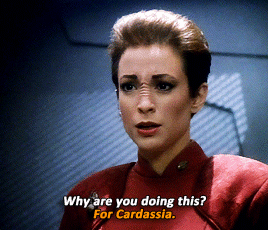
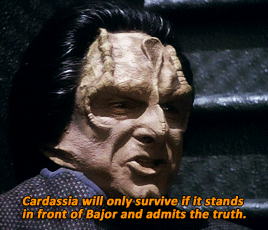
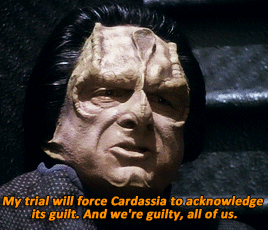
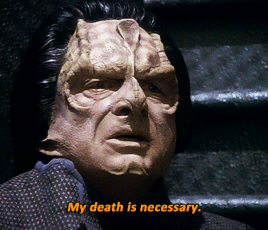
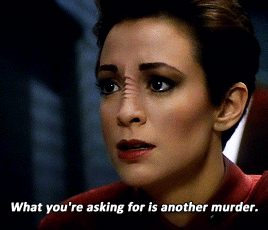

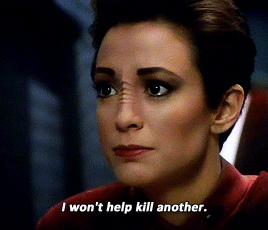
- I covered my ears every night. I couldn’t bear to hear those horrible screams. You have no idea what it’s like to be a coward, to see these horrors and do nothing. Marritza’s dead. He deserves to be dead. - You didn’t commit those crimes, and you couldn’t stop them.
STAR TREK: DEEP SPACE NINE “DUET”
2K notes
·
View notes
Text
Star Trek DS9 Duet
So a while back I had an anon message me on how awesome Star Trek DS9 is in response to a similar comment I had made. I intended to reply to it but I didn’t have time too and unfortunately when I got to it I accidentally deleted it. The anon said something about how the episode “Duet” was one of his or her favorites. Duet really was an incredible episode and really went far beyond any other Trek episode before.
The basic rundown of Deep Space Nine is that it focuses on a space station around the planet Bajor. Bajor has spent decades suffering under Cardassian occupation, the Cardassians being especially cruel to the point of orchestrating massacres and mass murder. The Cardassians withdraw from the planet after brokering a treaty with the Federation, and Deep Space Nine is a co-operated by the Bajorian Militia and Starfleet. Duet was one of the first season episodes, at a time when the show was still trying to find itself and many of those early episodes where mediocre or just plain bad. Duet kind of shows what the character of the show would be later on.
One day the station has a guest visitor who is later identified as Gul Darheel, the commandant of a death camp called Galletep where hundreds of thousands of Bajorans died from disease, starvation, exhaustion, or mass execution. The Cardassian is immediately arrested and held for war crimes charges. At first it seems that Gul Darheel is cartoonishly evil, and the main protagonist, Major Kira, who was a former member of the Bajoran resistance who liberated the camp, is happy enough to see him hanged from the highest tree.
youtube
However, after investigations it is revealed that the man they hold is not Gul Darheel, but a file clerk at the camp named Amin Marritza, he is pretending to be Darheel because he believes he should be punished for the sins of the Cardassian people. That even though Darheel had been dead for years, he could stand in for Darheel and at least some form of justice could be had.
youtube
Major Kira releases Marritza, but he is then stabbed to death by a Bajoran mob. The feels...
63 notes
·
View notes